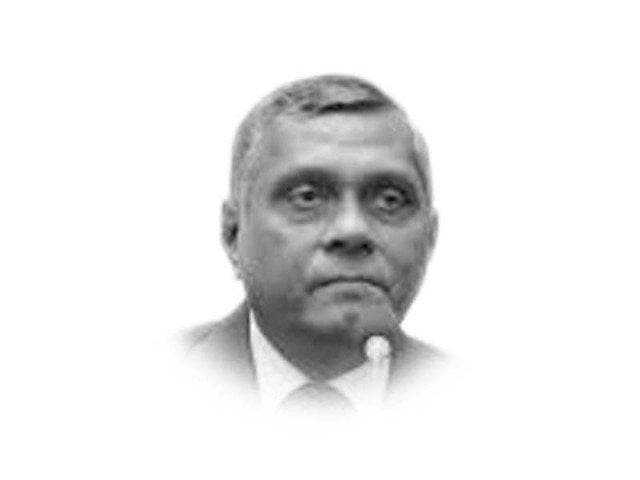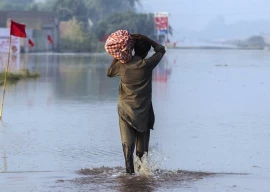
Three weeks after the regime change in Bangladesh, the question of legitimacy for the interim government is getting serious with each passing day. People are questioning the contention of Dr Muhammad Yunus, the Chief Adviser of caretaker government, that he has the mandate to launch reforms and cleanse Bangladesh of the mess created as a result of the 15-year-long rule of Sheikh Hasina. The crisis of legitimacy in Bangladesh is a reality as the 'honeymoon period' of the caretakers is over and people want issues which led to the 'second revolution' to be resolved.
If Sheikh Hasina, the ousted prime minister, is facing a difficult situation because of the cases piled up against her ranging from murders to extra-judicial killings and use of brute force to quell the students' agitation, her vulnerable position reflects a paradigm shift in Bangladesh. A year ago, was there any one who could perceive the manner in which Hasina would be booted out of power and her party would be in a quandary? It means, as long as she enjoyed confidence of the military rather than the people, she felt herself invincible. Her arrogance and overconfidence to deal with the students' agitation with an iron hand proved counterproductive. The turning point was on August 4 when thousands of people entered Dhaka from Ghazipur with their resolve to siege the Prime Minister House. The confidence of Sheikh Hasina got shattered in front of the mob and she agreed to the option given by Army Chief General Waker-uz-Zaman to step down and seek a safe exit from Bangladesh. It was shameful for Sheikh Hasina, who claimed a two-thirds majority in the January 2024 general elections, to be discredited by her own people and fleeing to India.
Now the real challenge for the interim set-up is how to seek legitimacy and prevent another outbreak of crisis. The students' movement, which paved the way for Hasina's departure, is not over. Its dynamics have, however, changed. Now, the students' leaders, particularly Nahid Islam who is also part of the caretaker set-up, are seriously thinking to provide an alternate leadership and do away with the dynastic politics based on the two-party system. To what extent the students remain united to prevent the return of Awami League's mode of governance remains to be seen. How far the military will back the interim set-up in the rehabilitation of the institutions which, according to Dr Yunus were destroyed during the 15 years of Hasina's government, depends upon the support of people and the student community at large.
In 2006, when the term of the then Prime Minister Khaleda Zia expired, a caretaker set-up took over. According to the Bangladesh's constitution, a caretaker set-up could have only lasted for three months, but it continued for two years. After that the 2009 general elections were held in which Awami League came to power and did not relinquish control till August 5, 2024. Hasina revoked the caretaker set-up through a constitutional amendment due to which the legitimacy of the elections held in 2014, 2019 and 2024 was questioned. Now, the present set-up which came into force as a result of the students' movement needs to seek legal status. Not only will the Awami League, which has been at the receiving end since August 5, challenge the legality of Dr Yunus as Chief Adviser of the interim set-up but human rights and civil society organisations will also go to court and launch protest if the present interim government fails to get a legitimate status.
How Dr Yunus, who enjoys popular support as well as the backing of the army and the students, will proceed to earn legitimacy needs to be examined from three angles.
First, what matters is the role of the judiciary which according to Dr Yunus was compromised and inundated with the Awami League supporters. As a result, not only had the Supreme Court Chief Justice to resign but pressure is also mounting on those judges who sided with Sheikh Hasina. If the interim government files a petition before the Supreme Court to seek legitimacy to its rule and there are counter petitions from the opponents challenging the legality of the government, the outcome will be a long legal battle. In the meantime, Dr Yunus's set-up will continue and if the Supreme Court rules against him, the outcome will be aggravation of the prevailing crisis. In 2007, the interim set-up was able to get legitimacy from the Supreme Court as the Awami League influence on the superior judiciary was then limited. But, now in 2024, state institutions are inundated with the Awami League supporters, and it would not be easy for the Dr Yunus-led interim set-up to getting the legitimacy from the Supreme Court.
Second, on the flip side, international community is not hostile to Dr Yunus's government because of his strong connections globally. Except for India, there is no country in the world which has reservations about Dr Yunus holding power. But certainly India is an influential neighbour of Bangladesh and the discourse in the Indian media about the regime change in Dhaka reflects how biased New Delhi is about those who are now at the helm of affairs. The respect and influence of Dr Yunus internationally can be gauged from the fact that last year, more than 100 renowned global personalities, including former American president Barack Obama and former UN Secretary General Ban Ki Moon, had written a letter to the then prime minister of Bangladesh Sheikh Hasina urging her to stop victimising Dr Yunus.
Third, while the current regime in Dhaka has no problem with global legitimacy, what matters is fulfilling domestic legal requirements, particularly from the Supreme Court, or by holding a referendum. It is yet to be seen how Dr Yunus will cope with the issue of legitimacy, but apparently he is confident that with international and domestic support, he can continue and implement his agenda of institutional reforms. The role of spoilers is vital too. Certainly, India is in a stronger position to cause harm to the economy of Bangladesh and use its network to weaken the caretakers. In that case, it is better for the Chief Adviser to take immediate steps to get his regime legalised by either approaching the Supreme Court or by holding a referendum. Furthermore, holding free and free elections in the coming months will certainly ensure stability in the crisis-ridden Bangladesh particularly when the floods are causing a humanitarian crisis in parts of the country.





1725967717-0/Untitled-design-(3)1725967717-0-165x106.webp)











COMMENTS
Comments are moderated and generally will be posted if they are on-topic and not abusive.
For more information, please see our Comments FAQ